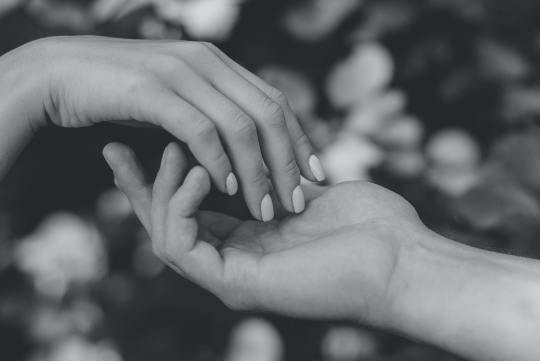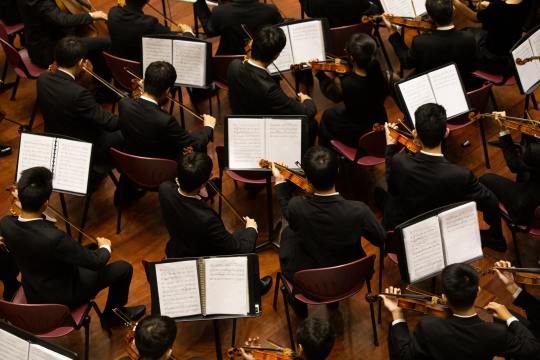Text
Old Memories, New Meaning
Lots of things have changed in my life over time, but one thing has remained constant.
From Day 1, I've always had strong opinions about music.
My parents tell me that even before I could walk, I already had developed a taste for Kenny Rogers' songs (go figure). I would crawl over to their giant stack of vinyl records, then leaf through them one by one until I found the one with Kenny's bearded face on the cover.
I'd crawl back over to my parents while carrying that record in my tiny toddler hands, begging them to play it. Among my first words were, "Ken Wodgers! Ken Wodgers!"

By the time I reached kindergarten, I graduated to more sophisticated, serious, thoughtful music: my parents' 8-track cassette of KC and the Sunshine Band. Sure, their music was already 10 years old at that point, but that didn't stop me from wanting to boogie after I got home from Mrs. Hattaway's class. It was clear that my musical selections were shaped by what my parents happened to have sitting around their small-town Texas living room in the mid 1980s.

That changed in the fall of 1989, when I saved enough birthday money to splurge on a state-of-the-art Magnavox cassette boom box (with TURBO BASS!!!) and finally earned my musical freedom. My first purchase? The brand-spanking-new Billy Joel album, Storm Front.
In retrospect, it wasn't one of his best albums, but it did provide a fantastic soundtrack for massive bedroom-floor concerts attended by legions of Lego men and women. I built some impressive venues for them to enjoy "We Didn't Start the Fire," which was always a highlight of their live-music experience.

Fast-forward to today, and I'm still learning new things from the songs on that album. I hadn't thought about it in years — more like three decades, which is hard to believe — but I listened to the entire thing, start to finish, on Spotify tonight while on a walk around my neighborhood.
I remembered most of the songs word for word, chord for chord, from my childhood with only a few exceptions. One of them was "And So It Goes," a song I remember hearing when I was 9 but didn't care for at the time. It's little wonder why a kid who hadn't even had a crush yet didn't particularly understand a song about shifting relationships and vulnerability.
youtube
It's absolutely beautiful.
In every heart there is a room A sanctuary safe and strong To heal the wounds from lovers past Until a new one comes along
I spoke to you in cautious tones You answered me with no pretense And still I feel I said too much My silence is my self defense
And every time I've held a rose It seems I only felt the thorns And so it goes, and so it goes And so will you, soon, I suppose
But if my silence made you leave Then that would be my worst mistake So I will share this room with you And you can have this heart to break
And this is why my eyes are closed It's just as well for all I've seen And so it goes, and so it goes And you're the only one who knows
So I would choose to be with you That's if the choice were mine to make But you can make decisions too And you can have this heart to break
And so it goes, and so it goes And you're the only one who knows
I won't dissect the whole song (even though the music-opinion-holding side of me wants to so, so badly!) But I will say I appreciate how delicately it treats the intersection of intense love with privacy, vulnerability, risk and fear.
Middle-age me sees the beauty in this song. Nine-year-old me was only able to see the slowness and sadness of it, which is why I would fast-forward through that part of the tape on my Magnavox boom box. It was lame.
Adult me does the opposite of child me: skip right past "We Didn't Start the Fire." It's lame. Seeing how the meaning of art changes through the lens of time and experience has been one of the most remarkable and wonderful things about getting older. I can't wait to find out what unexplored nuggets are waiting to be reinterpreted by the new me years down the road.
0 notes
Text
Dope Thoughts
“Is dopamine not the meaning of life?“ I’ve been thinking a lot about the implications of this life philosophy: whoever gets the most dopamine wins the game. It’s trite, but there’s more than a nugget of truth in it.

Much of the appeal of polyamory is centered around endorphins — as are most life philosophies, including organized religion, if we’re honest. There’s a psychological high that comes from thinking you’re the chosen few, the select, the most correct. It applies as much to people who think they’ve found the one true relationship format — or at least the most valuable and best fit for them personally — as it does to people who think they’ve figured out the prayers, rituals, habits and deprivations that win them immortality. Polyamory equals hedonism. They’re one and the same. I hate the fact that hedonism can have a negative connotation. Even religious zealots are hedonists in the strict sense because they derive pleasure from following dogma. Hedonism is a practice every human engages in, including those among us who would be the last to admit being hedonists.

Religion equals hedonism. They’re one and the same. Love, sex and emotional intimacy all create waterfalls of endorphins, an overflowing Niagara Falls cocktail of happy brain chemicals that cancel out the mundane reality of modern existence. Polyamory is about getting high. Monogamy also is about getting high, as is religion-inspired abstinence. They’re all different ways of getting to the same goal, and I think the different paths we pick to get there boil down to the way our brains are wired. Monks get that high through romantic deprivation; monogamists get it from the illusion of commitment; polyamorists get it from the thrill of variety and ever-present possibility of future serendipitous relationships falling into our laps. They're just different paths to the same destination: endorphin floods. If that makes me a nihilist, so be it. I don’t want the nihilists to be right. I suspect they are. And if that’s the case, that makes it even more important to arrange my life in a way that maximizes endorphins for me and everyone I love. I want to live in a way that makes it easy to flood the brain with dopamine from every avenue one can find it: the beauty of nature, the thrill of meaningful work, human intimacy in all its forms, artistic creativity and expression, vigorous physical exercise, and the sensual pleasures of food and drink. So that settles it. I need me and everyone I love to move into a multi-million-dollar estate in Preston Hollow. There’s just that little problem of money ...

It’s also interesting that dopamine, which most people assume is the cause of pleasure, is in actuality the chemical responsible for making us crave pleasure. It’s just highly correlated with pleasure because when we crave something easily attainable — a chocolate bar, an orgasm, a walk in the garden — we always make that thing happen. It’s a blessing and a curse of being human. That makes me think that the Buddhists are even more correct than the nihilists. If we can manage to rid ourselves of craving, then we eliminate the need for constant dopamine in our bodies. And that means I logically have two conflicting things I should aim for: either become a Buddhist monk or a Preston Hollow billionaire.
0 notes
Text
Towering Battlegrounds
A flute concerto was on the program for Thursday night at the symphony hall. I came for the Strauss — Richard, the writer of tone poems, not Johann, the writer of God-awful oom-pah waltzes — but it was the flute music from a composer I’d never heard of that stuck with me that night.

When I think “flute concerto,” I imagine peaceful, happy, tweedley-dee bird music. What Joan Tower wrote in the 1980s, though, was anything but calm.
It was more like watching a flute homicide happen on stage, an epic battle between the soloist and the orchestra.
Spoiler alert: The soloist wins after launching a barrage of nuclear arpeggios. I almost expected him to stop the music, lift his flute over his head and start beating the string players senseless.
Poignantly, the flute battle echoes an internal battle I’m feeling over conflicting needs.
I’m good at sculpting my life into what I want it to be. The problem is that as life gets more complicated from the intersection of various people I love, the very definition of polyamory, I’m faced with choice overload that makes it nearly impossible to pick what to sculpt.
It would be much easier if I decided what kind of hero I wanted to be.

Hero Dad would pick what’s best for his children, obviously.
Hero Husband would pick what’s best for his wife.
Hero Boyfriend would pick what’s best for his girlfriend.
Hero Businessman would pick what’s best for his company and employees.
Hero Hedonist would pick what’s best for himself, which is an especially tempting choice for someone who spent years under the oppressive thumb of conservative religion.
Part of me wants to find the answer in a spreadsheet. If I could just figure out which scenario would create the most dopamine for the largest number of people, the math could decide things for me. Is dopamine not the meaning of life? That’s as good an answer as any I’ve heard.
0 notes
Text
At the Heart of a Calendar Experiment
Love is neither quantifiable nor finite. Time is both quantifiable and finite.
That’s the problem at the center of my current calendar experiment that has me floating between two houses, a polyamorous nomad who splits time somewhat evenly between my wife and my girlfriend for two months.
There are risks in doing this, not the least of which is how it could impact our children. We don’t want my kids to feel abandoned or neglected by their father, nor do we want to leave the impression that we’re blending families at a most awkward time, right as our children are preparing to leave the teenage shipyard and slide down greased rails into the choppy Bay of Adulthood.
At the conclusion of our grand experiment, we’ll all compare notes and evaluate whether or not it was a success.
How will we measure success? By how much we learn. So far, just a week into the evaluation, it’s looking successful from my perspective.
OPENING UP

I’ve come to realize that the risk of silence about my unconventional relationship outweighs the risk of opening up about it. If someone stumbles upon my reality — say, seeing me holding hands with a woman I’m not married to — I lose control of the narrative. I become the victim of assumption at that point, and it’s entirely possible that I won’t even know that people saw me and are now drawing unsavory conclusions about me. The fictional tales they write in their own heads about my sleazy, shameful lying and cheating could become the dominant story when I’d prefer people know the more mundane truth: I’ve consciously picked an unconventional relationship structure in the most ethical way I know how with the full consent, and occasional prodding from, my wife of 20 years.
And let’s be real. By “unconventional,” I mean something that is extremely common but, for reasons that will likely always remain murky to me, is not considered a social norm. The longer I live, the more I realize monogamy is almost nonexistent. It’s a fantasy, yet that fantasy has become the social expectation for generations of Western people who hook up, swing and cheat while hoisting the monogamous banner.
The most honest people among us, of course, realize and admit that fact of humanity. I prefer calling them honest or observational rather than non-judgmental, although both labels frequently overlap. It’s those honest people who I’m very reluctantly opening up to.
CLOSE FRIENDS

“Are you guys free for dinner? I’m here with my longtime girlfriend, and my wife says you should meet her.”
That’s the out-of-the-blue text I sent my friends who I knew were at the same art festival we were mutually visiting. After a long pause — we figured they needed time to shit themselves, then more time to clean up — we made dinner arrangements at the kind of trendy, upscale restaurant that always serves as stark contrast with my middle-age, awkward, plaid-shirt frumpiness.
They thought I was punking them. I was not. And after three hours of lovely conversation over mind-blowing mushroom cakes, sunchoke pâté and gnocchi, we’d deepened our friendship with the closeness that only brutal honesty can bring.
The next night, we repeated the process over a dinner we prepared ourselves: bruschetta, corn salad, grilled scallops and peach melba trifle. Our guest was my girlfriend’s close friend, who opened up about some current relationship struggles she’s dealing with.
It was beautiful. We’re all human, trying to figure this stuff out. Giving and receiving raw truth — not for validation or approval, merely for connection — feels absolutely wonderful.
The food was a hit, too. Our guest described the dessert as an “orgasm in my mouth.”
EMOTIONAL WHIPLASH

One of the hardest parts of dealing with a somewhat long-distance relationship is the emotional explosion that happens when you say goodbye.
I felt that feeling bomb go off when I was leaving home, saying goodbye to my wife and kids for a week away. The fact that I was leaving wasn’t unusual, as I travel all the time for work and fun solo trips, but this time felt different. Driving away, I experienced a sad longing sensation, the kind of nostalgic melancholy that I only noticed in Brahms’ symphonies after I had some age under my belt.
Before the return trip home, it felt even more intense. It was Stravinsky sadness this time, shocking and maddening. I ugly-cried all alone after saying goodbye to my girlfriend after a blissful week, not because things ahead were so bad, but because things behind were so good.
The emotional high of opening up to a few close friends surely contributed to that, but it’s not the only reason. This roller coaster of intense highs and lows has been a continuous thread in the years since opening our marriage. It comes with the territory, I suppose, of having to say goodbye and hello so frequently when you deeply love more than one person.
Part of my sadness, though, came from a realization: I can’t have what I really want.
My fantasy life involves peace and stability. I dream of a quiet, tiny, neatly kept cottage where I socialize at the Quaint Orchid Growers Society and cook meals from the heirloom vegetables I grew from seed in my garden. My nights are filled with smoky Scotch, burning incense, silky jazz and long, thoughtful, introspective conversations with my brilliant, beautiful, monogamous wife who can’t wait to unleash her sensual side when the curtains close.
That’s the dream.
It’s not possible for that dream to become my reality, though, and not just because it’s ridiculous.
For one thing, I couldn’t ask my wife or my girlfriend to give up their other partners, any more than they could ask me to do the same thing. It’s impossible, at least, if you really love someone. Secondly, even if I had my minimalist/monogamist dream life, I would miss the freedom and excitement that polyamory provides. I’d agonize over the love I’m potentially missing out on, knowing what I know now about how great it can turn out. Even though I’m not looking for someone new to date now — the calendar forbids it, and the monogamist clinging inside me doesn’t really want it — the ever-present possibility of serendipity isn’t something I’ll easily give up.
My emotional side craves something that my cognitive side knows is impossible, but the craving for that fantasy is still very real.
CHANGE, LIKE NATURE

The stability within my fantasy is especially appealing during a stage of life, and a current experiment, where I have to check my smartphone to see where I’ll be laying my head every night.
I’m a creature of routine. I want my Quaint Orchid Growers Society meetings every Wednesday at noon, my Scotch-sipping friends every Friday night at 7, and my head in the same bed, with the same person, every night. We’ll sip chamomile tea by the fire at sunset and share coffee by the garden window at sunrise.
Again, that’s the fantasy, whether it’s my own brain wiring or my conservative religious upbringing at fault for it.
That fantasy is a black-and-white snapshot; my current life is a color IMAX movie. It’s ever-changing, larger and much more vibrant than the small, still life in my dreams.
If there’s a solution to be had, I suspect it will involve learning to appreciate the changes in my life for their own unique beauty. I’ve already got a good allegory for it: Alaskan wilderness.
On our trip to the far north a few weeks ago, one of many things I marveled at was how different all the scenery can look day to day, moment to moment. The light changes. The weather changes. The tide rolls in and out. The wildlife comes and goes.
If I took 10,000 snapshots from the cabin porch, every one of them would be different. There’s a beauty in that, of the constant change, and it’s telling that nothing in nature stands still. The universe itself is growing, pulsing, creating, destroying. We’re part of that.
When relationships change in their infinite ways — growing, pulsing, creating, destroying — it’s not something to be afraid of, which is a default reaction for many of us.
Instead, change is the most natural thing we can do as humans, mirroring the very nature we see all around us. We’re not meant to be static beings. We’re meant to change, just like everything else in existence.
2 notes
·
View notes